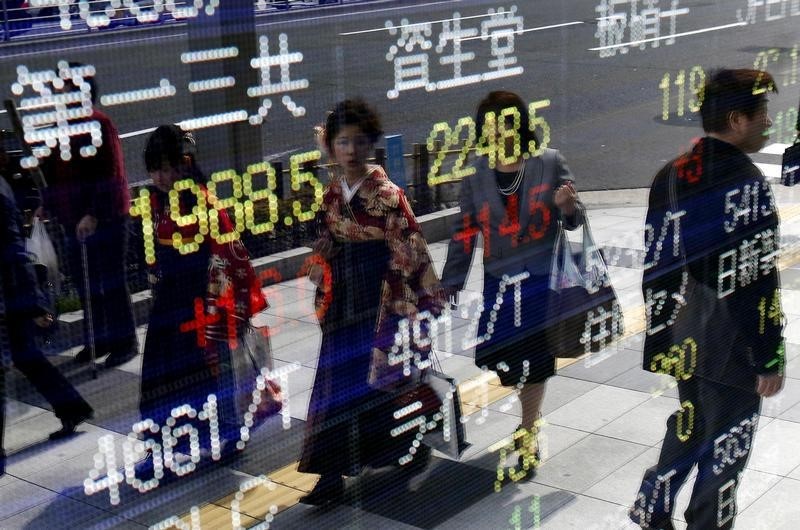Investing.com-- Most Asian stock markets advanced on Monday with Chinese markets leading gains following a string of positive business activity readings from the country, although overall gains were held back by threats of more tariffs from U.S. President-elect Donald Trump.
Regional markets took a positive lead-in from a record-high close on Wall Street on Friday, as investors maintained bets that the Federal Reserve will cut rates later in December. But U.S. stock index futures edged lower in Asian trade, following Trump's tariff threat.
Chinese shares jump on upbeat factory activity
The Shanghai Shenzhen CSI 300 and Shanghai Composite indexes rose 0.5%, and 0.8%, respectively, while Hong Kong’s Hang Seng index edged up 0.2%.
China's factory activity expanded in November, with the Caixin Manufacturing PMI rising to 50.3 from 50.1 in October, data showed on Monday. This marks the highest reading since June, driven by stronger output and new orders, reflecting the positive effects of recent government stimulus measures.
The government PMI data released over the weekend also showed that China’s manufacturing sector grew slightly more than expected in November.
The positive factory readings came after Beijing rolled out a string of aggressive stimulus measures since late-September to support economic growth. Investors are now holding out for more supportive measures from China, especially in the face of heightened trade headwinds under Trump.
Asia stock gains limited by Trump tariff threat
Gains in Asian markets were held back by Trump threatening to impose 100% tariffs on goods from BRICS nations (Brazil, Russia, India, China, and South Africa) if they move to undermine the U.S. dollar by creating or backing alternative currencies. Trump emphasized that countries attempting to replace the dollar in global trade would face severe economic consequences, effectively losing access to the U.S. market.
This comes after Trump's last week vow to impose higher import tariffs against China, Mexico and Canada, which could spark a renewed trade war between the world's biggest economies.
South Korea's KOSPI index gained 0.2%, while the Philippines' PSEi Composite index climbed 0.8%.
Malaysia's FTSE Malaysia KLCI index rose 0.5%, and Indonesia's Jakarta Stock Exchange Composite Index inched 0.2% higher, while India's Nifty 50 Futures index dropped 0.2%.
In Japan, the Nikkei 225 index edged up 0.2%, while the TOPIX gained 0.4%, despite data showing that country's factory activity shrank for the fifth consecutive month in November.
Australia's ASX 200 inched up 0.1% after data showed country's retail sales climbed more than expected in October on higher discretionary spending.
Fed cues, RBI decision due this week
Markets will be focused on a slew of key economic cues this week for more cues on U.S. and global interest rates. Australia is set to release its third-quarter gross domestic product figures on Wednesday.
Fed Chair Jerome Powell is set to speak on Wednesday, while key U.S. nonfarm payrolls data for November is also due later in the week.
The Reserve Bank of India (NS:BOI) will also decide on its key interest rates on Friday, and is widely expected to keep rates unchanged amid sticky Indian inflation.
